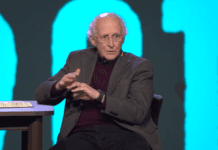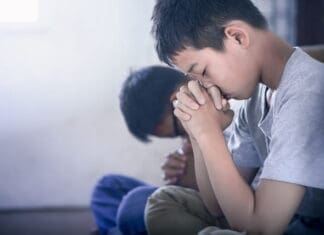In Episode 9 of his series, “Uncomfortable Conversations with a Black Man,” former NFL player Emmanuel Acho sat down with members of the Petaluma, California, police department. Acho and the officers had a transparent discussion about topics including George Floyd, Black Lives Matter, and the movement to “defund the police.”
“I would say that proximity breeds care and distance breeds fear,” said Acho. “There is not enough proximity between people who don’t look like each other.” This distance, specifically between white police officers and Black individuals, leads to more fear and less empathy. That is why conversations like the one he and the officers had “is what we need more of.”
Emmanuel Acho and Police Officers Make Efforts to Understand One Another
Joining Emmanuel Acho on stage were four white police officers named Garrett Glaviano, John Antonio, Brendan McGovern, and Ryan McGreevy. A live audience, comprised of other members of the Petaluma Police Department, watched the discussion, and Acho occasionally addressed some questions to an officer in the audience named Nick.
The conversation was filled with questions from Acho and the officers that displayed a desire for empathy and understanding. For example, Emmanuel Acho asked the officers what went through their minds when they saw the video of George Floyd. McGovern answered, “I felt sick.” He said it was hard knowing that people were going to watch that video and associate Derek Chauvin’s actions with every police officer.
Acho asked McGreevy if he thought there was enough accountability for police officers who commit injustices. “That’s tough to answer on a national standpoint,” said McGreevy. “I mean, if you look at the George Floyd incident, that police officer was terminated, arrested, and charged like immediately, which I think is appropriate.” But McGreevy did say he thought there were “some issues” in general with police accountability.
One of the officers asked Acho what he thought justice would look like. “Decisive and equal punishment,” Acho responded. He does not believe this is the norm right now. If a doctor is guilty of malpractice, that doctor will immediately have his or her license revoked. But if a police officer is guilty of excessive force against a Black person, then people immediately raise questions about the victim’s character and criminal background. “It instantly goes to character defamation,” said Acho.
The Pressures of Policing
Emmanuel Acho wanted to know what it was like for the officers to deal with the pressures of their role. He specifically asked McGovern how hard it is to deal with a person dying while he is on the job. McGovern responded that it was “incredibly difficult.” He said, “It’s changed me for the duration of my life. I don’t ever see it going back.” Regarding the pressure never to make a mistake, McGovern said he does not believe it is realistic to expect police officers to be perfect because they have to deal with so many complex, unexpected situations. For example, they might respond to a domestic violence call where all they know is that a man and woman are involved. Then they show up and the woman is naked and the man is holding a baseball bat. The officers then have to decide at that moment how to react. It is a lot to ask.
Acho asked Antonio, who is now retired, if he feels like a weight has lifted off of him because of no longer dealing with the daily pressures of the job. “One hundred percent,” said Antonio. “When I finally was done I was so, like, relieved I actually started sleeping again.” He does feel bad about retiring because he feels as though he has left his teammates on the field, but at the same time he is now going to the gym again and feels “so glad” to be done.
Perceptions and Assumptions
Antonio asked Acho if police officers make him nervous. Laughing, Acho said, “Heck yes.” But it would be different if the officer were Black. Black people often experience white spaces as foreigners, Acho explained. When he is out in public, he is constantly looking to see if there are other Black people around because there is an instant connection between them because of their shared experience. With a Black officer, he said, “I see he’s Black before I see he’s a cop. I see you all are cops first.”
Acho wanted to know if McGovern approaches dealing with a Black suspect differently than he approaches a white suspect. McGovern said, “Yes,” but went on to explain that what is going through his mind with a Black suspect is an awareness that public attention will be heightened because of the suspect’s ethnicity. McGovern’s morals and values do not change, but he does adapt the way that he speaks and handles himself “because I don’t want to seem like the, you know, giant white officer trying to…force myself upon the Black male suspect.”
At different times, the officers asked Emmanuel Acho what they could do to relate better to people of color. Glaviano pointed out that it is not uncommon for people of color to accuse officers of targeting them because of their ethnicities. That “becomes a barrier to communication,” he said. “How do we disarm that? How do we get around that?” At another point, Nick wanted to know how white officers could help Black juveniles to see them as role models and mentors instead of as their enemies.














